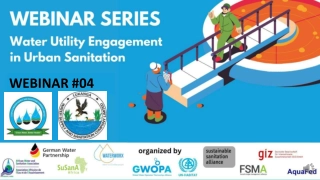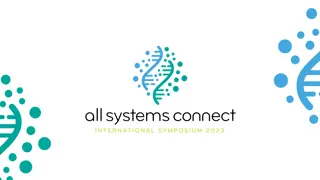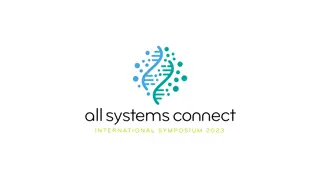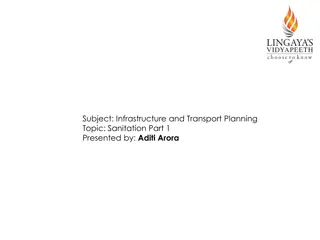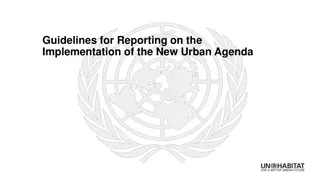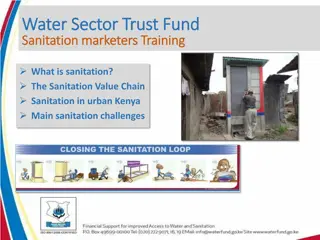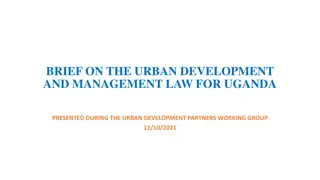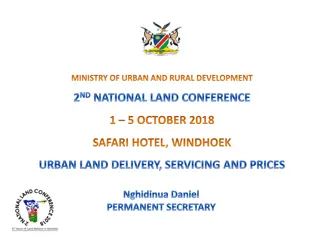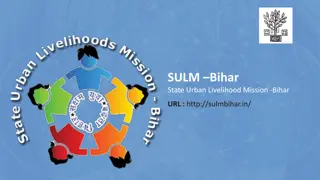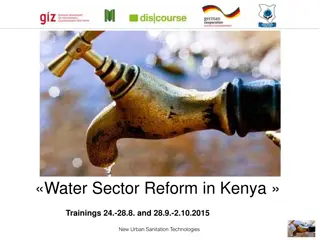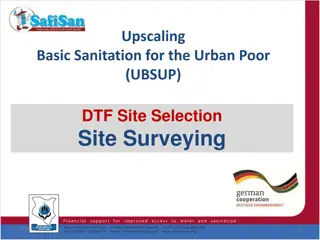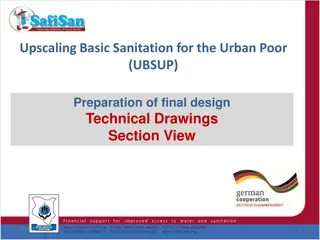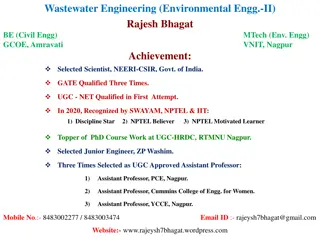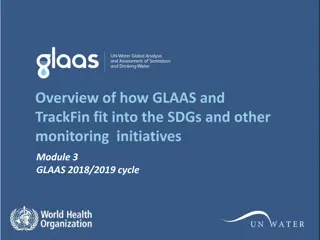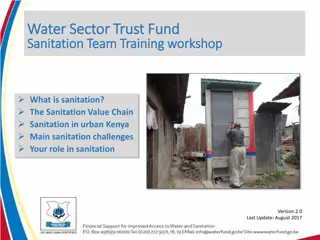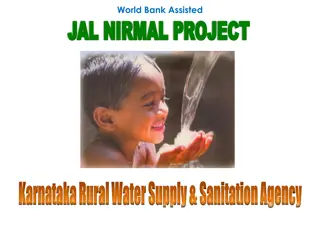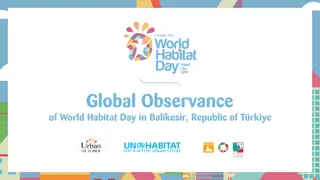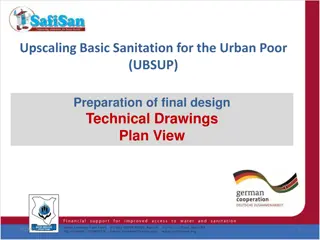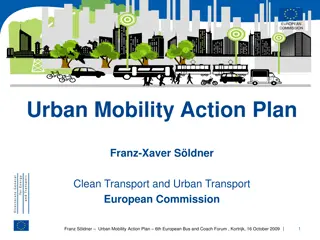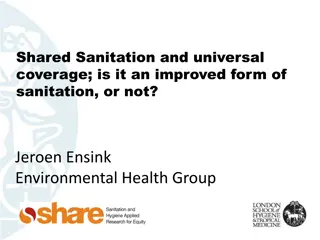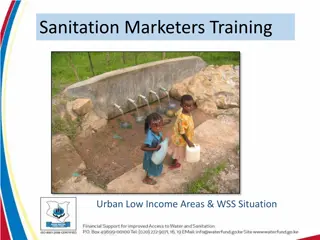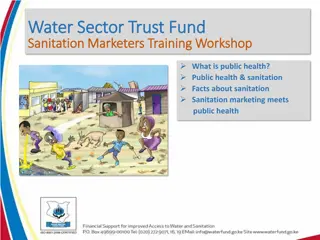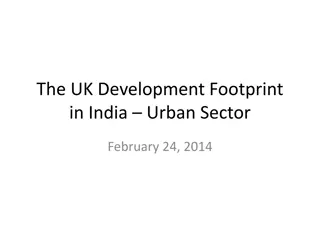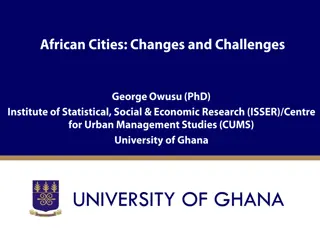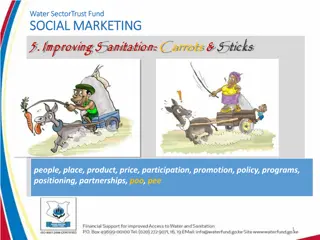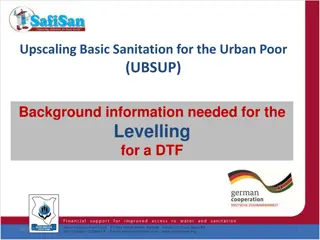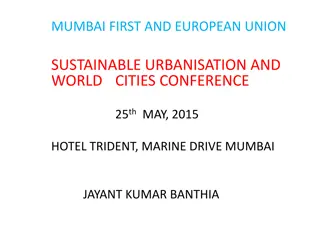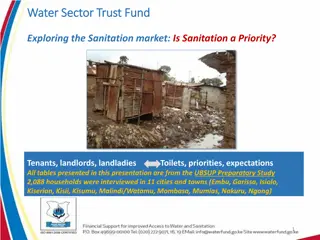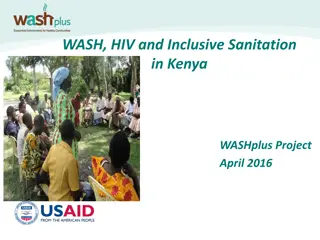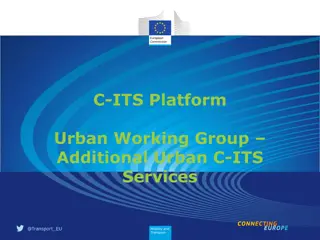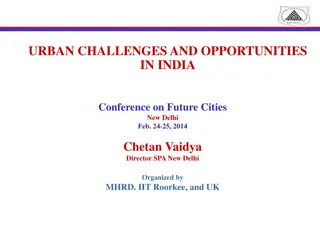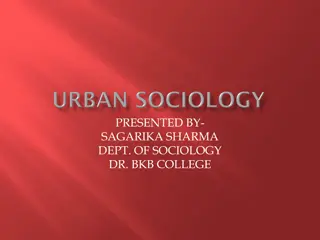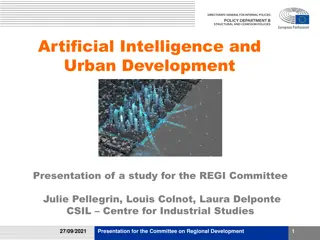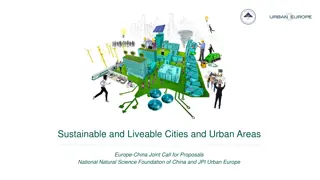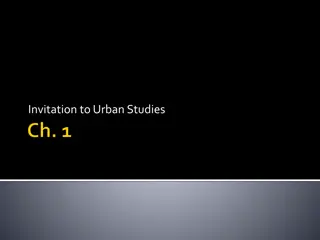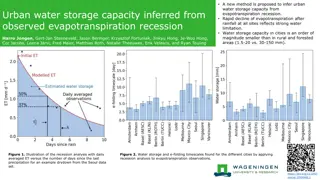Leveraging Finance Intermediaries for Sanitation Sector Growth
USAID's Water, Sanitation, and Hygiene Finance 2 (WASH-FIN 2) aims to mobilize $375 million by 2027 for climate-resilient water and sanitation services in Kenya, India, and Ghana. The project focuses on strengthening governance, improving service provider performance, and expanding partnerships. Tec
1 views • 12 slides
Webinar #04: Utilities Driving Citywide Inclusive Sanitation in Zambia
Webinar #04 focuses on the role of commercial utilities in promoting citywide inclusive sanitation in Zambia. The event aims to facilitate knowledge exchange among water operators in Africa to enhance urban sanitation access. The agenda includes case studies from Luapula and Lukanga, guided discussi
0 views • 56 slides
Progress on Global Monitoring of Safely Managed Sanitation Services
Presentation on the progress of safely managed sanitation services globally, highlighting the off-track status towards meeting SDG targets. It covers the distribution of on-site and sewered sanitation, wastewater treatment, and challenges in safe management. The project includes pilots in Bangladesh
2 views • 18 slides
Smart and Targeted Sanitation Subsidies for Inclusive Market Systems
This research explores the effectiveness of targeted sanitation subsidies in improving access to sanitation facilities for poor households in Cambodia and Ethiopia. It addresses the challenges of sustainability and inclusivity in market-based sanitation approaches, highlighting the controversy surro
2 views • 21 slides
Dallas Comprehensive Urban Agriculture Plan Summary
Dallas's Comprehensive Urban Agriculture Plan focuses on promoting urban agriculture to ensure all communities have access to healthy, local food. The plan includes strategies to reduce regulatory barriers, support land access, provide education and resources, facilitate partnerships, and build mark
6 views • 7 slides
Challenges and Solutions in Urban Sanitation Infrastructure Planning
Sanitation plays a vital role in promoting public health by preventing human exposure to waste hazards and ensuring proper sewage disposal. This presentation covers key aspects of sanitation, including the generation, collection, treatment, and disposal of sewage in urban areas. It highlights the ga
0 views • 15 slides
Guidelines for Reporting on the Implementation of the New Urban Agenda
The guidelines emphasize the importance of periodic follow-up and review of the New Urban Agenda by Member States to ensure effective implementation. They stress inclusivity, transparency, and voluntary participation in tracking progress towards sustainable urban development goals. The document outl
2 views • 11 slides
Sanitation Challenges and Solutions in Kenya
Sanitation in Kenya faces significant challenges, with only about 31% of households having overall access. The Water Supply and Sanitation Collaborative Council defines sanitation as the management of human excreta, wastewater, and solid waste, along with hygiene promotion. The Sanitation Value Chai
0 views • 9 slides
Overview of Uganda's Urban Development and Management Law
Vision 2040 and National Development Plan emphasize the pivotal role of cities in Uganda's development. The absence of a legal framework for urban development led to fragmented mandates across ministries. Efforts are underway to establish a comprehensive legal framework for sustainable urban develop
0 views • 5 slides
Challenges and Solutions in Urban Land Delivery and Pricing in Namibia
The Urban Land and Housing Sector in Namibia faces significant challenges such as a backlog in land delivery, high input costs, weak urban planning, and limited institutional capacity. These issues lead to slow supply rates and affordability problems for end users. Addressing these challenges requir
0 views • 20 slides
Overview of SULM Bihar State Urban Livelihood Mission
The SULM Bihar State Urban Livelihood Mission, an initiative under the National Urban Livelihoods Mission (NULM), aims to empower urban poor households through self-employment and skilled wage opportunities. The mission focuses on poverty reduction and enhancing livelihoods sustainably by establishi
0 views • 13 slides
Understanding New Urban Sanitation Technologies and Systems in Kenya
Explore the comprehensive training sessions and innovative technologies introduced for water sector reform in Kenya, focusing on urban sanitation systems. Gain insights into wastewater management, functional groups, sanitation value chain, and user interface, essential for sustainable sanitation sol
5 views • 25 slides
Urban Poor Basic Sanitation Site Surveying Guidelines
Guidelines for conducting a site survey in urban areas to prepare the final design for basic sanitation facilities for the urban poor. The process involves site selection, surveying techniques, and data collection methods, including boundary marking, raster leveling, module arrangement, and levellin
0 views • 13 slides
Urban Poor Sanitation Upgrading: Technical Design Drawings
Preparation of final design technical drawings for upscaling basic sanitation in urban poor areas. The session covers baseline data collection, existing levels, and required minimum levels for effective sanitation infrastructure. Details on drainage channels and design cross-section drawings are inc
0 views • 16 slides
Rural Sanitation and Wastewater Management Practices
Rural sanitation plays a crucial role in maintaining sanitary conditions in villages and small towns, where more than 70% of the population resides in India. The implementation of proper waste disposal facilities, such as pit privies and eco-sanitation systems, is essential to prevent the spread of
0 views • 61 slides
Overview of GLAAS and TrackFin in Relation to SDGs & Monitoring Initiatives
GLAAS and TrackFin play crucial roles in aligning with SDGs, particularly focusing on water and sanitation targets. The 2030 Agenda emphasizes the importance of sustainable development through various global indicators and targets, such as access to basic services, universal health coverage, and mit
2 views • 22 slides
Understanding Sanitation: Promoting Health Through Proper Waste Management
Sanitation is essential for promoting health by preventing human contact with hazardous wastes and ensuring proper waste treatment and disposal. Hygienic practices, treatment facilities, and personal hygiene all play vital roles in maintaining sanitation. The World Health Organization defines sanita
1 views • 26 slides
Karnataka Rural Water Supply & Sanitation Project Overview
The Karnataka Rural Water Supply & Sanitation Project, assisted by the World Bank, focuses on enhancing water supply, sanitation facilities, and community empowerment in rural areas. The project involves components like water quality tests, household toilets, and women empowerment activities. Throug
0 views • 19 slides
Roundtable on Urban Regeneration: Social Value Creation with Diverse Speakers
The Roundtable on Urban Regeneration focuses on challenges posed by Covid-19, Climate, and Conflicts on inequalities. It explores how urban regeneration can address these challenges and create social value while reducing poverty and inequality. The event also delves into the role of the private sect
0 views • 15 slides
Urban Poor Sanitation Design Technical Drawings and Planning View
Ensuring basic sanitation for urban poor, this project involves designing and planning technical drawings with a focus on upscaling basic sanitation facilities. The content provides insight into the context of the session, potential DTF layouts, considerations during layout preparation, and baseline
0 views • 17 slides
European Commission Urban Mobility Action Plan Overview
The European Commission's Urban Mobility Action Plan focuses on promoting sustainable urban transport to address the challenges faced by urban areas in Europe. The plan emphasizes the importance of efficient transport for economic growth, citizen concerns related to urban mobility, and the role of t
0 views • 12 slides
Decent Housing Project for Improved Water Supply and Sustainable Sanitation
Towards enhancing urban water supply, sustainable sanitation, and energy use for decent housing, the project led by Jacob Kihila and Patrick Willems aims to address challenges such as solid waste management, water access, and space utilization. With a focus on research and societal engagement, the p
0 views • 12 slides
Impacts of Marketisation on Home Care for Older People in Urban China
This study by Wenjing Zhang from the University of Bristol delves into the effects of the marketisation process on home care for the elderly in urban China. It explores the rationale behind the marketisation of care, the trends in home care marketisation, and the processes involved. The background s
0 views • 19 slides
Debate on Shared Sanitation: Improved or Not?
The discussion revolves around the classification of shared sanitation as improved or unimproved. WHO and UNICEF have a classification system where shared sanitation is considered unimproved due to concerns about cleanliness and accessibility. A proposed policy change by JMP seeks to include shared
0 views • 22 slides
Target Areas for Sanitation Marketers Training in Urban Low-Income Areas
Target areas for sanitation marketers training in urban low-income areas include informal settlements, planned urban areas with low-income housing, informal housing in planned residential areas, urban IDP settlements, and urban sub-centers. These areas present challenges with water supply and sanita
0 views • 18 slides
Importance of Sanitation in Public Health Promotion
Public health interventions focus on improving health and quality of life by preventing and treating diseases, promoting healthy behaviors, and addressing sanitation issues. Lack of clean water and proper sanitation can lead to the spread of various diseases, highlighting the crucial link between sa
0 views • 8 slides
UK Development Footprint in India Urban Sector - Towards Smart Urbanisation
The UK has been engaged in the urban sector in India for over 30 years, focusing on slum infrastructure development initially and transitioning towards sustainable development and smart urban growth. The emerging priority is smart urbanisation, aiming to build inclusive and climate-resilient cities
0 views • 10 slides
Understanding African Urbanization: Challenges and Trends
Unpacking the narratives of African urbanization and cities, this collection explores Africa's unique urban revolution, urban challenges, and the prevalence of informality in its cities. Data and projections highlight the evolving urban landscape across different regions in Africa, emphasizing the s
0 views • 14 slides
SafiSan Toilets Initiative for Improved Sanitation Practices
The SafiSan toilets initiative focuses on promoting improved sanitation practices through a combination of incentives and regulations. The project emphasizes access to adequate sanitation as a human right and highlights the benefits of utilizing SafiSan toilets, which are affordable, user-friendly,
0 views • 10 slides
Levelling Techniques for Urban Sanitation Improvement Projects
Explore the essential aspects of levelling, including setting benchmarks, calculating important levels for a DTF, reading cross-sectional drawings, and using optical levels. Understand the significance of benchmarks, backward calculations from discharge points, and individual level definitions for e
0 views • 23 slides
Urbanization in India: Trends and Challenges
The urban population in India has seen significant growth over the years, reaching 31.30% in 2011. However, urbanization in India faces challenges such as lopsided growth, lack of industrialization, and issues with rural-urban migration. Despite this, India has a dispersed urban population, with var
0 views • 21 slides
Exploring Sanitation Priorities and Investments: Insights from UBSUP Preparatory Study
The presentation discusses sanitation issues and priorities based on a survey of 2,088 households in 11 cities and towns. It highlights problems related to sanitation, residents' opinions on the need for improvement, types of toilets used, and investment plans in sanitation infrastructure.
0 views • 12 slides
Innovative Approaches to WASH and Inclusive Sanitation in Kenya
The WASHplus Project in Kenya has introduced innovative approaches to WASH and inclusive sanitation, focusing on Small Doable Actions (SDAs), Capacity Building, Menstrual Hygiene Management, Sanitation Uptake through CLTSplus, and promoting Inclusive Sanitation. Through training, collaboration with
0 views • 16 slides
Urban C-ITS Services for Enhanced Mobility and Transport Management
Urban C-ITS (Cooperative Intelligent Transport Systems) Working Group discusses additional services for improving mobility and transport in urban areas. Outcomes of meeting 1 include various C-ITS services like traffic signal priority, green light optimization, traffic information, and more. The cat
0 views • 24 slides
Urban Challenges and Opportunities in India: Strategies for Future Cities
This content discusses the urban challenges and opportunities in India, focusing on population trends, urban initiatives, and the Jawaharlal Nehru National Urban Renewal Mission (JNNURM). It emphasizes the need for sustainable, inclusive, and smart cities with strategies such as improving urban gove
0 views • 8 slides
Understanding Urban Sociology: A Comprehensive Overview
Urban sociology explores the dynamics of city life, urbanization, and urban communities. It delves into the origin and development of cities, social structures, family dynamics, class struggles, urban issues, and more. Key elements include population density, family structures, occupations, social h
0 views • 6 slides
Role of Artificial Intelligence in Urban Development: Study Presentation for the REGI Committee
Explore the implications of AI in urban development, addressing key definitions, expected benefits, potential risks, enabling conditions, and EU policy. Emphasize the importance of governance in implementing AI in urban contexts, highlighting benefits like improved urban management, economic opportu
0 views • 14 slides
Europe-China Joint Call for Sustainable Urban Development
This joint initiative between JPI Urban Europe and NSFC aims to promote research projects focusing on sustainable and liveable cities in both Europe and China. With a budget of 9.35 million euros on the European side, the call seeks to address key urban challenges such as economic transformation and
0 views • 21 slides
Insights into Urban Studies: Sociological Variables and Cultural Influences
Delve into the world of urban studies, exploring how urban sociology investigates systematic causes and effects on people in urban environments. Discover the challenges of defining 'urban,' understanding informal city structures, and navigating public spaces. Uncover the cultural influences of citie
0 views • 12 slides
Inference of Urban Water Storage Capacity from Evapotranspiration Recession Analysis
A new method is proposed to estimate urban water storage capacity based on evapotranspiration recession analysis, showcasing the significant differences between urban and rural/forested areas. The study highlights the strong water limitations in cities, leading to smaller water storage capacities. F
0 views • 4 slides

